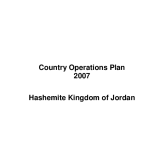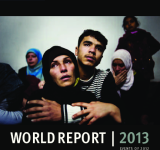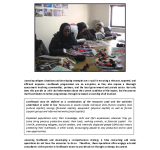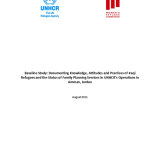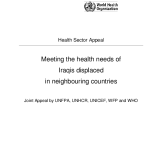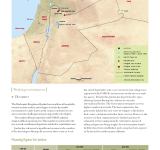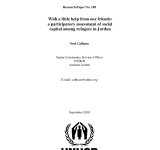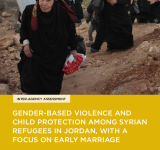refugee
This 23rd annual World Report summarizes human rights conditions in more than 90 countries and territories worldwide in 2012. It reflects extensive investigative work that Human Rights Watch staff has undertaken during the year;; often in close partnership with domestic human rights activists.
Assessing refugee situations and developing strategies are crucial in ensuring a relevant;; targeted;; and efficient response. Livelihoods programmes are no exception;; as they also require a thorough assessment involving communities;; partners;; and the local government and private sector. Not only does this provide us with vital information about the current condition of the region;; but the process itself contributes to better programmes through increased ownership of all involved. UNHCR Jordan developed a quality strategy using their internal resources and networks. This is a story about their experience and the lessons learnt in the process.
This report addresses a family planning (FP) study undertaken by the United Nations High Commissioner (UNHCR);; the Women's Refugee Commission (WRC) and the Centers for Disease Control and Prevention (CDC) among Iraqi refugees in Amman;; Jordan in June-July;; 2011. It documents the knowledge;; beliefs;; perceptions and practices of refugees;; as well as the state of service provision to improve programming and subsequently increase uptake of good quality FP services among Iraqi women;; men and adolescents.
This joint interagency appeal to the international community seeks a total of US$ 84;;833;;647 million to provide support to national efforts aimed at improving access to health care for displaced Iraqis living in Syria;; Jordan and Egypt. The activities prioritized in the appeal are based on the Common Action Framework agreed upon during the Ministerial Consultation to Address the Urgent Needs of Displaced Iraqis;; convened by WHO in Damascus from 29-30 July 2007.
This report provides an overview of UNHCR operations profile in Jordan in 2013. It includes an summary of the situation of refugees and asylum seekers in Jordan;; their figures and UNHCR's reponse in terms of strategies and projects.
This report examines the notion of social capital. The assessment has challenged some of the assumptions about the refugees served in Jordan;; as well as the understanding of the host community. With the strong support of senior management and the informed and enthusiastic engagement of the multi-functional team;; UNHCR Jordan is now identifying new ways to support refugees in strengthening their social capital.
The report aims to address the particular needs and cultural dynamics of Syrian refugees residing in Jordan;; especially with regards gender-based violence and child protection issues. It presents a comprehensive range of perspectives from urban Syrian refugees and local Jordanian decision makers in government;; community-based organizations and the religious and education sectors. The assessment of this report is based on data collected through three methodologies including questionnaire survey to refugees outside the Za’atari refugee camp;; focus group discussions in regions across Jordan and in-depth interviews. Key findings of the report are 1. The rates of early marriage are high;; 2. A significant percentage of children contribute to the household’s income and 3. Restrictions on women and girls’ mobility constrain their participation in social and economic activities and access to basic services. The report recommends measures to prevent acts of sexual exploitation and abuse and ensure the needs of the most vulnerable members of the Syrian refugee population in the cities.
